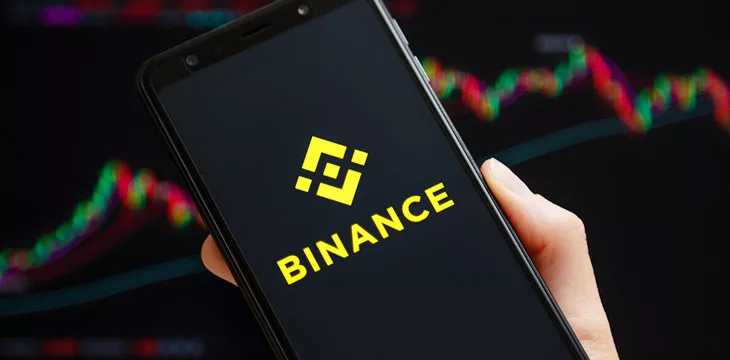|
Getting your Trinity Audio player ready...
|
Changpeng ‘CZ’ Zhao’s hiring of a former U.S. Department of Justice (DoJ) anti-money laundering specialist strongly suggests serious criminal charges against the Binance digital asset exchange are imminent.
Last week saw another flurry of filings regarding the ever-expanding legal team defending Binance in the U.S. Securities and Exchange Commission (SEC) civil case against CZ and his exchange for their “calculated evasion of the law.”
The new hires include attorneys with significant experience on the government side of the equation, most notably M. Kendall Day, a Gibson Dunn partner and a former Acting Deputy Assistant Attorney General at the DoJ.
Day co-leads Gibson Dunn’s anti-money laundering (AML) practice and represents both companies and individuals dealing with “criminal, regulatory, and civil enforcement actions involving AML/Bank Secrecy Act (BSA), sanctions, [Foreign Corrupt Practices Act] and other anti-corruption, securities, tax, wire and mail fraud, unlicensed money transmitter, false claims act, and sensitive employee matters.”
This is significant, given that neither the SEC’s suit nor the Commodity Futures Trading Commission (CFTC) civil suit filed against Binance/CZ includes money laundering charges. This strongly suggests that the DoJ’s long-anticipated criminal case against CZ is just around the corner.
Late last year, Reuters reported that the DoJ was prepping charges of unlicensed money transmission, money laundering conspiracy, and criminal sanctions violations against Binance. A month later, the Washington Post reported that the DoJ’s Washington state office was issuing subpoenas for U.S. hedge funds’ communications with Binance, allegedly to help pin down the exchange’s BSA violations.
Earlier this month, Fortune reported that the sprawling web of Binance-affiliated entities linked to CZ—and the details in both the SEC and CFTC suits linking these firms to criminal activity—could ultimately prove CZ’s undoing; particularly the billions of dollars belonging to customers of the Binance.US exchange that were flowing offshore to CZ-controlled entities without those customers’ knowledge and in apparent violation of U.S. banking laws.
Blockchain analytics firm Inca Digital provided Fortune with a visual graph of some 40 entities, all of which list CZ as a founder, director and/or beneficial shareholder. Inca CEO Adam Zarazinski said there is “very little distinction” between Binance and CZ, whose approach to avoiding local regulations can be so brazen that he “often uses his personal name and personal accounts” to accomplish this goal.
Utica College professor of economic crime Suzanne Lynch told Fortune that Binance’s meandering transaction patterns involving billions of dollars “seemed to be very tactical.” Lynch said the multiple red flags these transactions raised “is the foundation for, what I think, is the criminal indictment.”
A Binance spokesperson issued a statement saying the transaction pattern was “typical of most global corporate entities.” Perhaps, but the internal communications exposed in the SEC/CFTC suits show an atypical pattern of coordinated and systematic efforts to evade regulatory restrictions.
The highly detailed conversations discussing these efforts, which involve CZ and multiple members of Binance’s senior executive ranks, will make the DoJ’s job of proving violations of the Racketeer Influenced and Corrupt Organizations (RICO) Act a piece of cake. With each RICO count calling for as long as 20 years behind bars, CZ and his co-conspirators will have plenty of time to wonder how it all went so wrong.
Putin on the blitz
The bizarre coup-like machinations in Russia that captivated the world last weekend apparently led to a surge in Russians exchanging rubles for the controversial Tether (USDT) stablecoin. Digital asset data provider CCData showed a near quadrupling of volume on the ruble-USDT trading pair on Saturday as the Wagner Group’s convoy got ever closer to Moscow.
Tellingly, much of this trading occurred on Binance and Huobi. It was only last month that Bloomberg reported that the DoJ was probing whether Binance violated U.S. economic sanctions by allowing Russian customers to transact via the exchange. By now, the DoJ team looking at Binance is probably just grunting ‘add it to the pile’ as they continue building their case.
Rejected!
Meanwhile, U.S. District Court Judge Amy Berman Jackson issued an order on Monday denying a nuisance motion filed last week by Binance’s legal team in the SEC suit. That motion, filed on June 21, took exception to wording in a SEC press release announcing the deal the agency had made with Binance.US regarding the ‘repatriation’ of the exchange’s customer assets back from wherever CZ spirited them away.
The motion accused the SEC of misrepresenting the facts of the case, specifically that the Binance.US customer assets “have been dissipated, commingled, or misused in any way.” Binance’s attorneys accused the SEC of trying to “introduce unwarranted confusion into the marketplace,” which “risks tainting the jury pool with misleading descriptions of the evidence” and other nefarious big-city-lawyerin’ tricks.
Binance’s attorneys asked Berman to direct the SEC attorneys to “comply with all applicable rules of conduct concerning extrajudicial statements,” including not making any more misleading statements that might cause CZ’s Uber rating to drop or something.
Berman’s response was short and to the point, saying it was “not apparent that Court intervention … is needed at this time, or that it is necessary or appropriate for the Court to get involved in wordsmithing the parties’ press releases. Nor is it clear that the agency’s public relations efforts to date will materially affect proceedings in this case.”
Still, with some court-watchers estimating CZ’s legal tab as high as $1 million per day, his attorneys must do something, right? The latest schedule issued by Berman is still talking about deadlines for filing reply briefs as late as December 12, or about 170-odd days from now, with God knows how long after that before the actual court proceedings get underway. (Fire up the wash trading machines, STAT!)
No more Belgian waffling
Holding Binance to account is long overdue, but momentum is growing rapidly both in the U.S. and abroad. Late last week, Belgium’s Financial Services and Markets Authority (FSMA) ordered Binance to immediately halt all virtual currency operations within its borders.
Echoing Inca Digital’s map of Binance’s tangled corporate web, the FSMA said it had identified some 27 Binance-linked entities engaged in the operational and/or technical aspects of the Belgian-facing business, “of which 19 appear to be based outside the European Economic Area.”
The FSMA said it had made “several requests for information” regarding these entities but Binance “has not been able to demonstrate to the requisite legal standard” that these entities are based in the EEA.
As such, the FSMA ordered Binance to “return to the Belgian clients in question all cryptographic keys and/or all virtual currencies that Binance holds for their account,” or transfer the assets to a proven EEA-governed entity. The FSMA further warned Binance that the Crown Prosecutor of Brussels had been made aware of “acts that are liable to constitute a criminal offence.”
This marked the second GTFO order issued by a European Union market in as many weeks, following the Netherlands’ refusal to issue Binance a virtual asset service provider (VASP) license.
France also recently announced a probe of Binance’s local operation for “acts of aggravated money laundering,” while Binance asked regulators in Cyprus to deregister the exchange from the official list of crypto asset services providers.
Binance won’t let go of its privates
Despite European authorities’ growing antagonism towards Binance’s operations, the exchange announced that it was backtracking on previously announced plans to delist various so-called ‘privacy coins’ in select European markets.
In May, Binance advised users in France, Italy, Poland, and Spain that they’d be losing access to a dozen tokens as of June 26: Monero, Dash, Zcash, Beam, Decred, Firo, Horizen, MobileCoin, Navcoin, PIVX, Secret and Verge. Other exchanges had delisted many of the same tokens under pressure from regulators.
Binance customers have since reported receiving emails indicating that after “carefully considering feedback from our community and several projects,” only Beam, Firo, Horizen, MobileCoin, and Monero will be subject to the delisting.
Binance added, “we have revised how we classify privacy coins on our platform to comply with EU-wide regulatory requirements. As a crypto exchange with registrations in different EU jurisdictions, we are obliged to follow EU regulations that require exchanges to be able to monitor transactions for coins listed on our platform.”
Binance’s willingness to backtrack on its pledge to purge anonymity-focused tokens from its platform might temporarily staunch outflows (over $4 billion in the past 30 days), but it likely won’t win Binance any fans in European regulatory circles. CZ’s increasingly reckless moves suggest he’s aware that this saga is entering its final chapters, and he’s determined to squeeze every last nickel from his “crypto casino” before the power’s cut off.
Philippine alarm bells sound…again
Meanwhile, Binance’s unregulated operations in the Philippines continue to cause unease. On June 21, the Infrawatch public policy think-tank urged the country’s central bank to reconsider the threat posed by “unregistered cryptocurrency platforms,” with Binance and U.S. rival Coinbase (NASDAQ: COIN) singled out for special attention. An identical letter was sent a few days later to Emilio Aquino, chairman of the Philippines SEC.
In the letter to Bangko Sentral ng Pilipinas Governor Felipe Medalla, Infrawatch PH Convenor Terry Ridon notes the U.S. SEC’s recent civil suits against both Binance and Coinbase. Ridon cites the SEC’s allegations that CZ transferred billions of U.S. customers’ funds to offshore entities under his control without ever informing Binance.US customers of this fact.
Coinbase is singled out for failing to register with U.S. regulatory authorities and for having “prioritized its profits over investors’ interests and disregarded compliance with securities market regulations.”
With some 3.4 million Filipinos having opened accounts with these and other exchanges, Ridon warns that the exchanges’ absence of local registration “jeopardizes the financial security of millions of cryptocurrency traders.”
Ridon reminds Medalla that the Philippines’ SEC responded to a previous Infrawatch letter by acknowledging Binance’s lack of a local license to solicit investments and cautioning consumers against trusting Binance with their funds.
And yet that same month, Binance could somehow participate in a Philippine Senate committee meeting in which VASP licensing requirements were discussed. Ridon called this participation “truly alarming” and warned that Binance’s “blatant disregard for regulatory requirements and our laws is deeply concerning.” (Binance’s participation in Philippine law enforcement’s cybercrime efforts is even more alarming.)
Ridon expressed concern that Binance’s peer-to-peer trading model “could lead to increased money laundering activities.” Ridon notes that the Philippines remains on the Financial Action Task Force’s ‘grey list’ of countries with “strategic deficiencies” in their AML/terrorist financing protocols and warns: “If our regulators continue to exhibit leniency” toward Binance, Coinbase et al, “we risk remaining on this list.”
A brief historical parallel with some local flavor: some nine hours after the Japanese attack on Pearl Harbor, confusion and dithering on the part of U.S. military commanders in the Philippines led to the near total destruction of U.S. air strength on the ground. This left U.S. and Filipino forces without any air cover to repel the Japanese land invasion when it came.
The Philippines shouldn’t wait until it’s too late to protect their citizens from Binance’s reckless disregard for regulatory compliance. With U.S. criminal charges on their way, CZ may well feel his situation can’t get any worse, regardless of what he does next. Never turn your back on a cornered animal.
Follow CoinGeek’s Crypto Crime Cartel series, which delves into the stream of groups—from BitMEX to Binance, Bitcoin.com, Blockstream, ShapeShift, Coinbase, Ripple,
Ethereum, FTX and Tether—who have co-opted the digital asset revolution and turned the industry into a minefield for naïve (and even experienced) players in the market.

 05-08-2025
05-08-2025 





